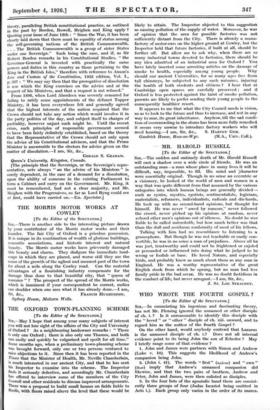THE OXFORD TOWN-PLANNING SCHEME [To the Editor of the SPECTATOR.]
SIR,—May I hope that among your many subjects of interest You will not lose sight of the affairs of the City and University of Oxford ? As a neighbouring landowner remarks : "There is only one Oxford ; there is also only one Thames, and both can easily and quickly be vulgarized and spoilt for all time." Some months ago, when a preliminary town-planning scheme Was brought forward, only one or two persons ventured to raise objections to it. Since then it has been reported in the Times that the Minister of Health, Mr. Neville Chamberlain, is much interested in our ancient City, and that he has sent his Inspector to examine into the scheme. The Inspector finds it seriously defective, and accordingly Mr. Chamberlain has offered to interview some of the members of the City Council and other residents to discuss improved arrangements. There was a proposal to build small houses on fields liable to floods, with floors raised -above the level that these would be likely to attain. The Inspector objected to this suggestion as causing pollution of the supply of water. Moreover, he was of opinion that the area for possible factories was not sufficiently distant from the City. There is already a manu- factory of motor-cars on the higher ground at Cowley, but the Inspector held that future factories, if built at all, should be further off. But allow me to ask why, when there are so many industrial towns devoted to factories, there should be any idea admitted of an industrial area for Oxford ? You have lately inserted some arresting articles on the damage of smoke to health, especially among young people. Why should our ancient Universities, for so many ages free from tall chimneys, be subjected to any such nuisance, injuring the health of both students and citizens ? I hear that at Cambridge open spaces are carefully preserved ; and if Oxford is less protected against the taint of smoke pollution, parents are likely to prefer sending their young people to the consequently healthier resort.
It appears to me that what the City Council needs is vision, so as to look to the future and thus to increase, and not in any way to mar, its great inheritance. Anyhow, till the sad condi- tion of overcrowding in the slums has been more fully remedied it seems very unwise to introduce factory workers who will
need housing.—! am, Sir, /ie., S. HARVEY GEM.
Goodrich House, Ross-on-Wye. (M.A., Univ. Coll.).


































 Previous page
Previous page